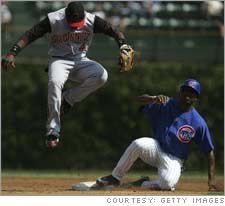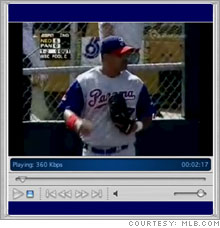Progress seen in baseball labor talks Owners, players union could reach deal by Dec. 19 deadline without typical work stoppage or strike threats. NEW YORK (CNNMoney.com) -- Major League Baseball and the Players Association are making progress in quiet, almost daily labor negotiations, and the two sides appear poised to reach agreement on a new deal without the typical work stoppages or even strike threats that have characterized past labor agreements. The current labor agreement runs through Dec. 19. Sources have told CNNMoney.com that the progress in talks that have taken place with almost no public attention so far have been very encouraging to this point and that an agreement before the contract expiration looks likely at this point. MLB spokesman Pat Courtney, when told of the sources above characterization of the state of talks, said, "I think that's fair to say." But he cautioned he could not predict whether or not a new deal would be reached before the current contract expiration. The Dec. 19 contract expiration is somewhat of an artificial deadline. Even during contentious talks in the past, labor agreements have typically been extended beyond the contract expiration. Union spokesman Greg Bouris declined to comment on the talks. The two sides reached an agreement without a work stoppage in August 2002, but that came after the previous labor contract had been extended, and with the players only hours away from a midseason strike deadline. All the previous contracts dating back to 1972 were only accomplished with either a owners' lockout of players during the preseason or a players' strike during the regular season. This time the tenor of the talks have been very positive, although the sources said that the major economic issues, including the sharing of revenue between clubs and a so-called "luxury tax" that penalizes clubs with the largest team payrolls, have yet to be worked out. "It's been less contentious than a lot of people thought it would be," said one person familiar with the talks, who spoke on the condition his name not be used. "There seems to be progress being made," he continued. "It seems to be less acrimonious than it has in the past." He estimated the chance of a deal by Dec. 19 at about 60-40 at this point. The two sides could also agree to extend the current agreement if there is not a tentative deal in place by then. One other source, speaking on condition that his name not be used, cautioned there's a lot of work left to accomplish before there is a deal. "There's reason for optimism. But you know the history, there are no guarantees," he said. "There hasn't been any heavy lifting yet on the major issues yet." Baseball has thrived economically under the current labor agreement, and it is poised to set a new attendance record for the third straight year. It has reached new broadcast deals with Fox Entertainment (Charts), a unit of News Corp. (Charts), as well as Turner Broadcasting, which like CNNMoney.com is a unit of Time Warner (Charts). Those come on top of earlier national broadcast deals with Walt Disney (Charts) unit ESPN, and together the agreements have raised the leagues' national television rights deals by about 19 percent annually, with lucrative some playoff rights yet to be awarded. The sport has also tapped into new media rights fees, with MLB Advance Media becoming a leader in Internet streaming of games and a major source of revenue for teams, and the sport reaching an 11-year deal with XM Satellite Radio (Charts) to air all of its games on that system. The players have done well financially as well. Since baseball's last strike in 1994-95, the average player salary has almost tripled to $2.9 million from $1.04 million in 1994. The current major league minimum salary of $327,000 is slightly above the median salary of 1994, meaning half of all major leaguers were paid more than that and half were paid less that year. The Major League Baseball Players Association has long been the most united union in sports, if not in the country as a whole, as high paid players have been willing to give up pay during a strike on behalf of players who might come later. But after going through five strikes and three lockouts in a 23-year period, the relative peace since 1995 has left relatively few of the players now in the game have been through that experience. Only 87 of more than 800 players now on active rosters were playing in the majors in 1994, when the last strike began. Several teams have no players on their current rosters who went through the last strike. MLB and the players union partnered together to create the World Baseball Classic, an international competition in March with teams from 16 countries which was widely seen as a success for the game. Commissioner Bud Selig has not commented on negotiations, but at the All-Star Game in July, he pointed to the WBC when he said he was hopeful about the upcoming talks. "If somebody had suggested back in the '70s that you'd have a World Baseball Classic and the owners would partner with the players' association, you'd have heart attacks on both sides," Selig told reporters at that time. "The relationship between the parties is as good as I've ever seen it. There are tough negotiations ahead, but I feel we've come a long way." The sides seem to be going into these talks with a greater understanding of each other's positions. The owners have hired Smith College economics professor Andrew Zimbalist as an advisor for these talks. Zimbalist, who declined to comment on the talks when contacted, advised the players union during the 1994-95 strike, and also worked with the National Basketball Players Association during some of its labor talks. The union agreed to open the current contract twice in the last two years to strengthen provisions for drug testing and penalties for using performance-enhancing drugs such as steroids, although those agreements were reached under threat of Congressional action on the matter. The owners representatives on management's side of the negotiating table are Baltimore Orioles owner Peter Angelos, and Andy MacPhail, president of the Chicago Cubs, which is owned by the Tribune Co. (Charts) Owners were frequent critics of players and player salaries in the past leading up to negotions, but this year there has been no such attacks, as Selig has exercised strong controls over owners, threatening deep fines for anyone who speaks out about negotiations. __________________________________________ |
| |||||||||




